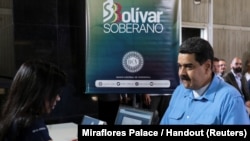Venezuelan President Nicolas Maduro was expected to arrive in Beijing on Thursday to strike deals with his crisis-hit country's biggest creditor.
Before departing Caracas, Maduro said the trip was "very necessary, very opportune and full of great expectations."
"We are leaving under better conditions, having activated a program of economic recovery, growth and prosperity. We are going to improve, broaden and deepen relations with this great world power," he said in a televised address on Wednesday.
Maduro will be in China for a state visit from Thursday to Sunday, according to the official Xinhua news agency.
China's foreign ministry said President Xi Jinping will treat Maduro to a welcoming ceremony and a banquet.
"China is confident that this visit will further enhance political mutual trust, deepen mutually beneficial and friendly cooperation between the two countries in various fields," ministry spokesman Geng Shuang told a regular press conference.
"Recently, the Venezuelan government has actively promoted economic and financial reform with a good social response. I think a stable Venezuelan development is in the interest of all parties," he added.
China has loaned some $50 billion to OPEC member Venezuela in the past decade, with Caracas repaying debt with oil shipments. The socialist-led Latin American country still owes $20 billion to Beijing.
Maduro may return home with a new $5 billion loan and a six-month extension to the grace period to service its debt, according to Venezuelan consultancy Ecoanalitica.
Vice President Delcy Rodriguez, who traveled to Beijing earlier this week, met with the president of China Development Bank.
Maduro's government has massively devalued the national currency as part of a raft of measures intended to halt the economy's free-fall into hyperinflation.
The International Monetary Fund projects Venezuela's inflation rate will reach 1,000,000 percent by the end of the year.
Hundreds of thousands of Venezuelans have fled the country, most of them into neighboring Latin American countries.
The trip to China is Maduro's first outside the country since he was allegedly targeted by exploding drones at a military parade in Caracas August 4. He last visited China in March 2017.
Venezuela's crude oil production fell in August to 1,448,000 barrels per day, a drop of 21,000 on the previous month, before according to figures released by the Organization of the Petroleum Exporting Countries (OPEC).
The figure represents the lowest level of crude produced in three decades, excluding a strike that lasted from December 2002 to February 2003.
The volume reported by the government remains the lowest of the last three decades, excluding the fall recorded by a strike of the sector between December 2002 and February 2003.
The government attributed the collapse to poor management of state oil giant PDVSA, which has been caught up in multiple cases of corruption, and to decreasing investments in infrastructure as a result of falling revenues.
It also blames sanctions by Washington that prevent the oil company from negotiating new debt in the United States.




